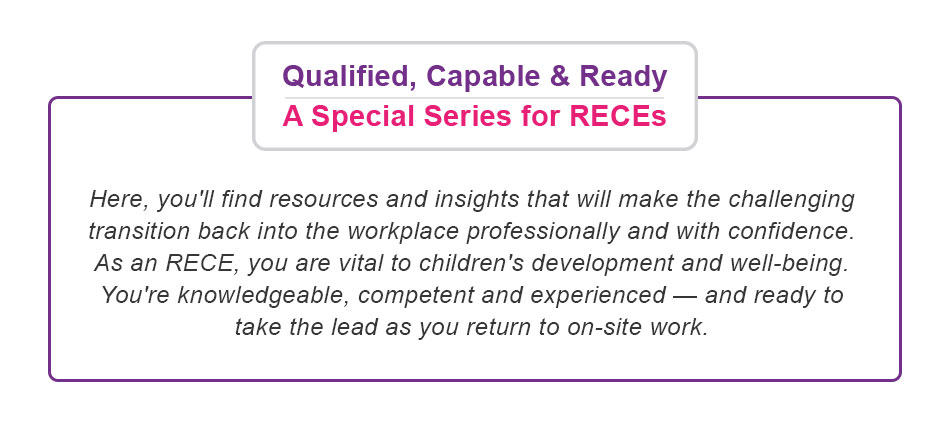
What is self-care?
The Centre for Addiction and Mental Health defines self-care as doing things that help you relax, feel better and that you enjoy, especially during times of stress. “Self-care can add meaning to your life while also supporting your health.”
“Helpers need time to re-energize, refuel and indulge in downtime because our work is very ‘other-person’ centred,” says Nadine, the registered psychotherapist interviewed in Feeling anxious? These tips from two mental experts might help. “If we aren’t prioritizing our own care and safety, we aren’t able to give safe and effective support in a sustainable way to others.”
The Practice Guideline on Professionalism, notes that “[as] an RECE, you consider the importance of your own well-being and self-care so you are able to uphold your ethical responsibilities in your daily practice.”
So, how can you engage in self-care in order to be ready and rested to provide the best in early learning and care?
We asked our mental health experts, Kelly and Nadine from our most recent article, for their suggestions for self-care, and how these activities can become part of your routine. Here’s what they had to say:
Nadine: “Now is the time to simply indulge in what simply feels good and brings you joy, and cycling these activities into your weekly routine. Daily self-care is a must – our bodies need healthy routines for sustainability, to refuel energy and build resistance to the additional stress we’re now carrying. Some positive habits include drinking water, movement and getting enough sleep.”
Kelly: “Two ways to keep anxiety at bay are building back a more regular sleeping and eating routine that may have been lost during quarantine. One suggestion to help bring self-care into your daily routine is to reflect on your day at the end of each shift and allow yourself to close anything that’s outstanding for you before you head home. Once you’ve done that, see if you can find something to do that signifies a switch back into your home-life – maybe it’s listening to music on the way home, taking the dog for a walk, spending time with family or friends, or engaging in an activity. Whatever it is that you choose should be something to help you get your mind off work in order to reset.”
Top tips

Make time for the things that bring you joy.
Eat as well as you can and drink lots of water so your body is energized.
Be on the move: exercise is not only good for the body, but also for the brain.
Get the right amount of sleep you need to feel ready and able to take on the day’s challenges.
Connect with others: sharing your challenges with others can help you feel supported when you need it most.
“Lend them your calm,” as Dr. Jean Clinton recommended in her latest presentation. Add in those relaxing activities to your routine to recharge.
The burnout is real
As a support- and care-based profession, being available to provide early learning and care can become a challenge when you’re not feeling like yourself.
By not making time for self-care, you run the risk of burnout. “[This] correlates to compassion fatigue where a few things could happen,” says Kelly Falconer, the registered social worker we recently interviewed. “The individual could experience feeling tired, rundown and irritable, losing interest in their job; becoming more negative in their attitude and outlook at work and home or avoiding positive interactions with others.”
Ready to return
“For so many of us, work is an important part of our lives,” Kelly says. “Getting back to work has been helpful for a lot of us, and the same goes for children who may be looking forward to returning.”
As we’ve reminded you throughout our Qualified, Capable & Ready series, we know that you have the skills and abilities to return to on-site work. By making your own self-care and mental well-being a priority, you’ll also feel ready to manage through the changes.




